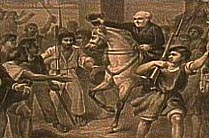Divisions in Mexico
The Divisions in Mexico during the War with the United States
By Miguel Soto
Universidad Nacional Autónoma de México
 Second Vista de Mexico by Pedro Lehnert
Second Vista de Mexico by Pedro LehnertDeGolyer Library, Southern Methodist University
At the time when it had to face the war with the United States, Mexico was living through the effects of profound economic, political and social divisions, lingering from the colonial regime from which the nation had extricated itself barely two decades before.
With Napoleon's invasion of Spain in 1808...which included the imprisonment and absence of the King and Queen— the authority structures of the Spanish empire collapsed, never to recover. In fact, the changes that were already being felt, due to the implementation of various administrative reforms, increased with the empire's collapse.
In New Spain, the political split became a sharp social antagonism, based on deep social inequalities, as various observers, such as Alexander von Humboldt, have pointed out.
 Such inequalities exploded violently in the insurgent movement, headed by Miguel Hidalgo, in 1810. However, the rebels' hopes were crushed militarily, and the social reforms were indefinitely postponed. In fact in 1821, after 11 years of war, the New-Hispanic oligarchy chose to move away from the mother country, rather than risk the threat to their privileges that came from the just-reinstated radical “cortes” (equivalent to a parliament).
Such inequalities exploded violently in the insurgent movement, headed by Miguel Hidalgo, in 1810. However, the rebels' hopes were crushed militarily, and the social reforms were indefinitely postponed. In fact in 1821, after 11 years of war, the New-Hispanic oligarchy chose to move away from the mother country, rather than risk the threat to their privileges that came from the just-reinstated radical “cortes” (equivalent to a parliament).
Thus, Mexico got its independence in the middle of a weak and fragile political compromise, which offered freedoms and reforms to the new nation while at the same time trying to keep intact many aspects of the social and economical structures of the colony. This ephemeral agreement came crashing down, and the first victim was the man who had finished the independence struggle, Agustín de Iturbide. After him, only the first President, Guadalupe Victoria, finished his term; and even he finished amid an armed insurrection which determined the following presidential secession. From that moment on, military rebellion became the normal means for resolving any authority disagreement.
Behind this political instability lurked the lack of economic and social agreements. Since, in addition to the uncertainty caused by Spain's refusal of independence for the new nation, the presence of Spaniards was seen as a new threat to national security, the nation resorted to a massive expulsion of Spaniards. In fact, the pretense of a desire for security masked the intent to replace the oligarchy of Iberian merchants; thus, their expulsion coincided with the armed rebellion which decided the first presidential succession.
From then on, a potential social upheaval, similar to the one championed by Hidalgo, was always latent. Therefore, no matter how many proposals of popular support for particular political programs, such initiatives were systematically rejected. The same thing happened in the middle of the war with the United States. Among others, Melchor Ocampo, who years later would excel as one of the main liberal ideologists of the Reform, proposed arming the civil population en mass, in order to beat the North American army in a guerrilla war.
Such proposals were rejected, considering that after eliminating the foreign enemy, the lower class masses, clearly the majority, could threaten the established social order. Therefore, the choice was to suffer and sacrifice whatever was necessary...even civil war caused by the Polko rebellion and, of course, a huge territorial loss...rather than endanger the continuation of that social order.
The United States as well faced serious internal divi-sions at the start of the war (besides the existing discrepancies between the Democrats and Whigs), such as the controversies caused by the annexation of Texas. These controversies were not resolved by the “joint expansionism” which fueled Polk's presidential campaign; and the internal split within the Democratic Party itself, due to the new tariffs as much as to the unsatisfactory diplomatic agreement reached with Great Britain regarding the Oregon Territory, vividly expressed by David Wilmot when Congress was faced with the executive request for funds to continue the war with Mexico, conditioning the approval of funds to the prohibition of slavery in any lands acquired through the war.
However, the fundamental difference between the two nations is that in the case of the United States, such disagreements did not have any influence on the development (and final outcome) of the military campaigns against Mexico. In the case of Mexico, on the other hand, in at least two instances (La Angostura and Padierna) the internal disagreements had a direct influence in the outcome of both battles. In other words, the deep dissensions among the Mexicans prevented them from creating a united front before a common enemy.






